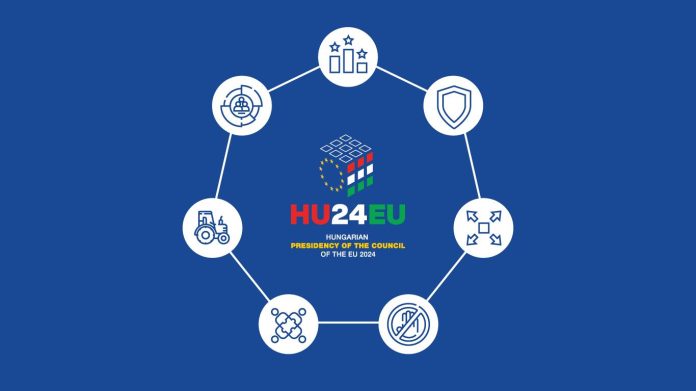The Presidency of the Council of the European Union (EU) rotates among the member states every six months. During this period, the presiding country leads the meetings of the Council of the EU and represents the Council in relations with other EU institutions, such as the European Commission and the European Parliament.
The state has the opportunity to shape the EU’s agenda, set priorities and mediate in reaching compromises between member states. The rotating presidency enables all member states to contribute to the work and development of the EU, promote their national interests in accordance with the general interests of the Union, and strengthen cooperation and solidarity within the EU.
Hungary took over the presidency of the Council of the EU from Belgium on July 1 and will hold the office until December 31. Belgium made significant progress during its presidency, concluding more than 60 legislative proposals and securing consensus on key issues such as the pact on migration and asylum, new fiscal rules and the nature restoration law.
Hungary is focusing on seven thematic areas during its presidency:
- improvement of EU competitiveness;
- strengthening of EU defense policy;
- a consistent and merit-based expansion policy;
- suppression of illegal migration;
- shaping the future of cohesion policy;
- promotion of EU agricultural policy oriented towards farmers;
- solving demographic challenges.
Improving EU competitiveness
In the context of international challenges, where Europe lags behind its global competitors, it is crucial to improve the productivity and competitiveness of the Union and its members and to stimulate economic growth. Hungary will advocate for the adoption of the New European Agreement on Competitiveness, integrated into all policies, with the aim of developing a technologically neutral industrial strategy, a flexible labor market and support for small and medium-sized enterprises.
Strengthening the EU’s defense policy
Current and new conflicts show the need for significant improvement of Europe’s defense capabilities, as well as capacities for international crisis management. Hungary will emphasize the strengthening of the European defense technological and industrial base, defense innovation and cooperation in the procurement of defense assets between the members, along with the implementation of the Strategic Compass that defines the main directions of the EU’s defense policy.
Consistent and merit based extension policy
Enlargement is one of the EU’s most successful policies. Hungary will strive to preserve this policy, which must remain merit-based, balanced and credible. The focus will be on the integration of the Western Balkans, which will contribute to the economic, security and geopolitical interests of the EU.
Suppression of illegal migration
Migratory pressure is a big challenge for the EU and its members, especially those at the external borders. Hungary will advocate for close cooperation with the countries on the borders of the EU, as well as with the key countries of origin and transit of migrants. Special attention will be paid to the external dimension of migration, effective cooperation with third countries, the return of migrants and innovative solutions for asylum.
Shaping the future of cohesion policy
For the harmonious and balanced development of the EU, it is necessary to reduce regional differences and ensure economic, social and territorial cohesion. Hungary will advocate for a strategic debate on the future of cohesion policy, including its role in promoting competitiveness, employment and addressing demographic challenges.
Promotion of EU agricultural policy oriented towards farmers
European agriculture faces many challenges, including climate change, rising costs and imports from third countries. Hungary will support sustainable agriculture, guarantee food security and work to formulate a post-2027 EU agricultural policy that is competitive, crisis-resistant and farmer-oriented.
Addressing demographic challenges
Accelerated population aging, unsustainable social systems and labor shortages represent long-term and growing problems in Europe. Hungary will focus on these challenges, using the Commission’s demographic tool released in October 2023, with the aim of improving the EU’s competitiveness and the sustainability of public finances.
Hungary assumes the presidency at the moment of the constitution of the new leadership in the European institutions, which provides an opportunity to lay the foundations for the future work of the EU in the coming period. After Hungary, Poland will take over the presidency of the Council of the EU on January 1, 2025.


